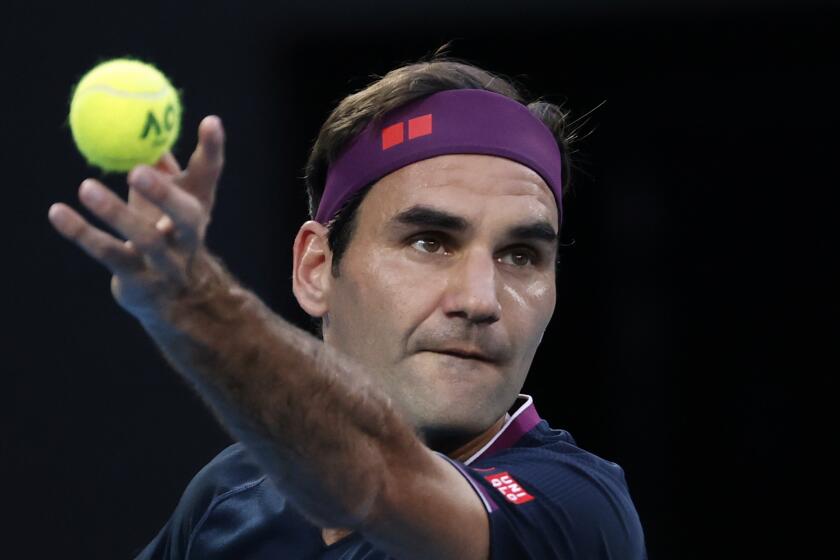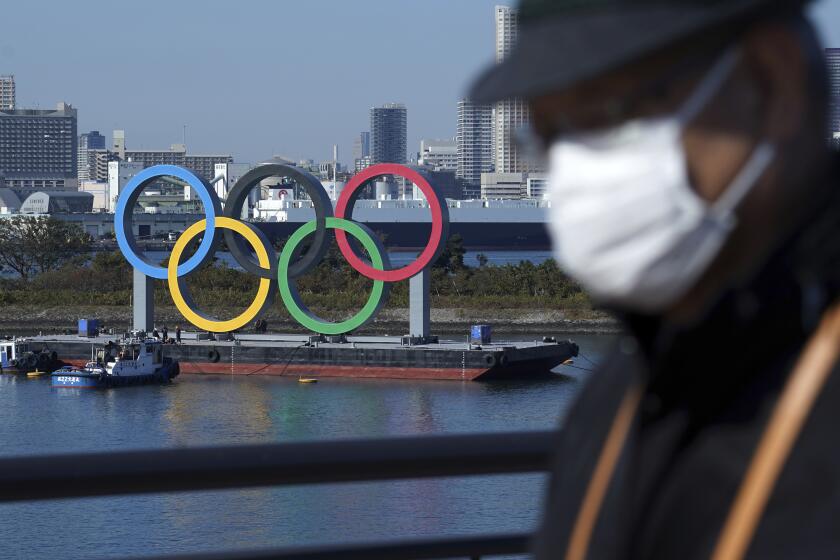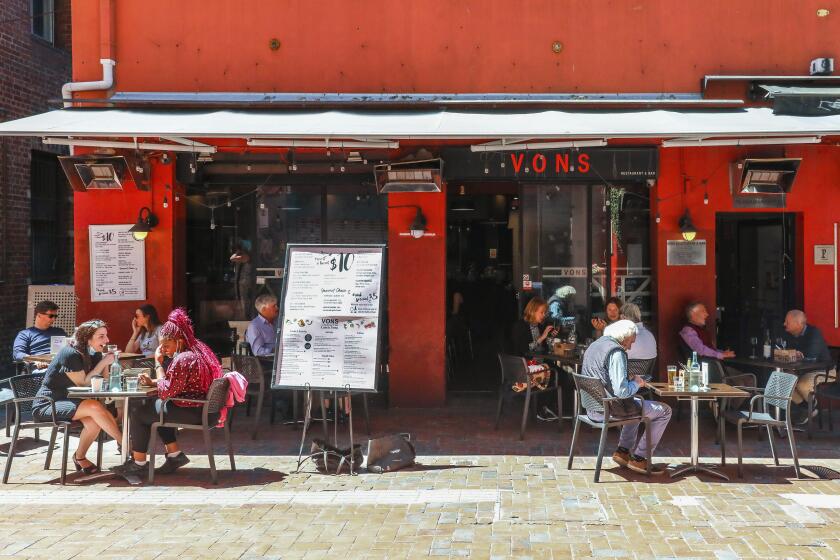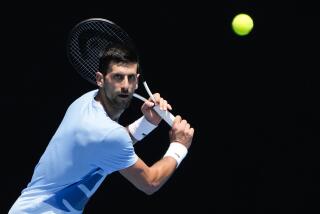72 tennis players in coronavirus lockdown as Australian Open approaches
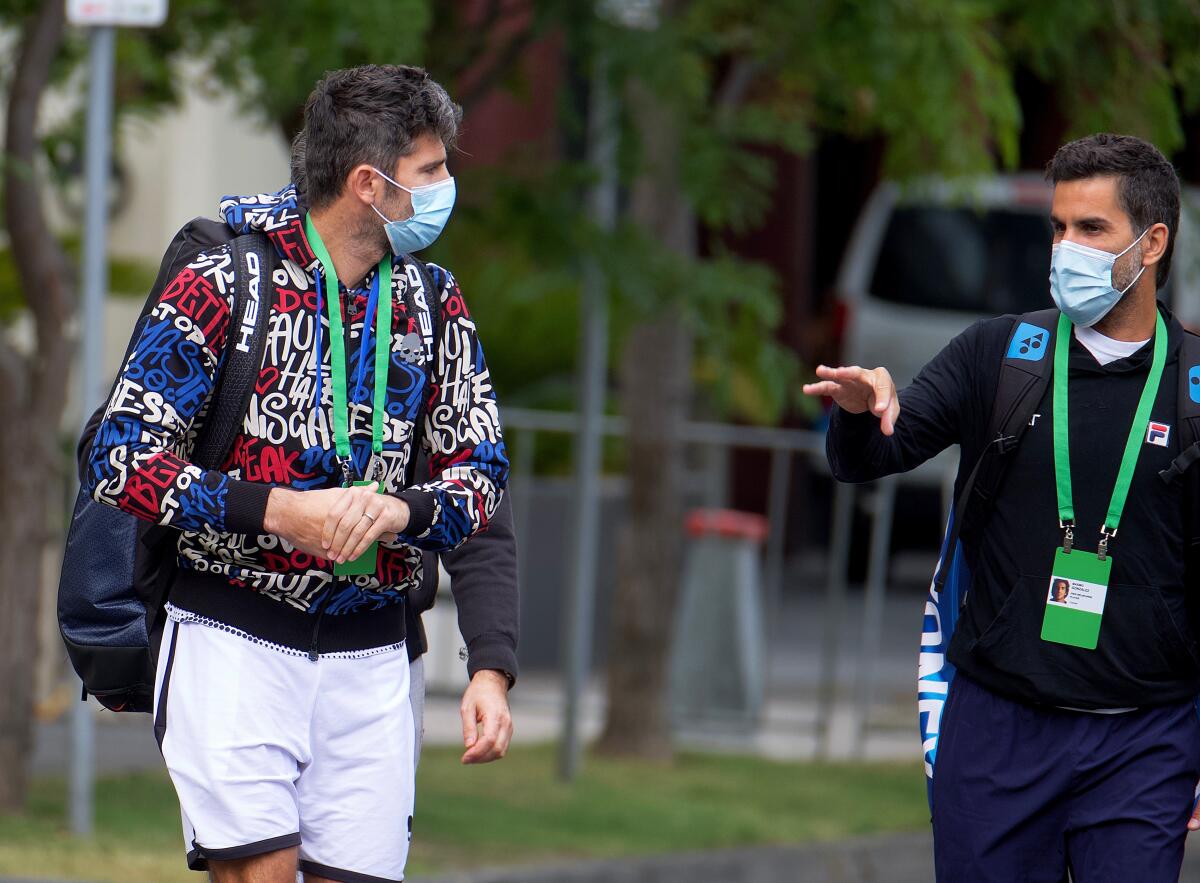
- Share via
The number of players in strict quarantine swelled to 72 ahead of the Australian Open after a fifth positive coronavirus test emerged from the charter flights bringing players, coaches, officials and media to Melbourne for the season-opening tennis major.
That means the players won’t be allowed to leave their hotel rooms or practice for 14 days, whereas other players in less-rigorous quarantine will be allowed to practice for five hours daily.
The Australian Open starts Feb. 8 following a week of warmup tournaments.
Australian Open organizers confirmed late Sunday that the latest case involved a passenger on a charter flight from Doha, Qatar, to Melbourne. Although the person is not a player, all 58 passengers on the flight, including 25 players, now cannot leave their hotel rooms for 14 days.
There were already 47 players, including Grand Slam winners, in hard quarantine after three positive tests were returned from a charter flight that arrived from Los Angeles and one from a flight that departed from Abu Dhabi, in the United Arab Emirates.
Some players have expressed anger at being classified as close contacts, and therefore denied training time, merely for being onboard flights with people who later tested positive.
Roger Federer, who has won 20 Grand Slam titles but is dealing with a stubborn knee injury, has withdrawn from the 2021 Australian Open.
But local government, tennis and health authorities have said that all players were warned of the risks in advance.
“There’s been a bit of chatter from a number of players about the rules. Well, the rules apply to them as they apply to everybody else, and they were all briefed on that before they came, and that was a condition on which they came,” Daniel Andrews, the premier of Victoria state, told reporters Monday. “There’s no special treatment here ... because a virus doesn’t treat you specially.”
Responding to reports that eight-time Australian Open champion Novak Djokovic had proposed a list of ideas for changing the quarantine conditions for players, Andrews said: “People are free to provide lists of demands, but the answer is no.”
Players have been warned that violating the rules could result in heavy fines or being moved to a more secure quarantine complex with police stationed at their doors.
Victoria’s COVID-19 quarantine commissioner, Emma Cassar, told a news conference Sunday that some people were “testing” or challenging the quarantine procedures, but there was “zero tolerance for that behavior.”
“This is designed to make people safe,” Cassar, who is also in charge of the state’s prisons, said. “We make no apologies for that.”
With coronavirus vaccines expected to become more available in the spring, U.S. athletes may need them to be allowed to compete in the Tokyo Olympics.
The first three positive tests were announced Saturday and two more Sunday. All five people had tested negative before boarding their flights to Australia. All have now been transferred to a specially designated hotel.
Among them is Sylvain Bruneau, who coaches 2019 U.S. Open champion Bianca Andreescu. He said he was on the flight from Abu Dhabi and had tested positive.
So far, no players have had a positive test result since landing in Australia.
Australian Open organizers said 17 charters flights from seven international destinations brought up to 1,200 people to Australia for the tournament. All arrived within a 36-hour period that ended Saturday morning.
Several players, including Sorana Cirstea of Romania, Belinda Bencic of Switzerland and Yulia Putintseva of Kazakhstan, complained on social media that the rules seemed to have changed between what they saw before traveling to Australia and what was being imposed in Melbourne.
Cirstea posted on Twitter: “If they would have told us this rule before I would not play Australia. ... I would have stayed home. They told us we would fly at 20% capacity, in sections and we would be a close contact ONLY if my team or cohort tests positive.”
But Victoria’s quarantine commissioner rejected those claims and explained why.
“If you’re on a plane 16 to 24 hours, with air that circulates throughout the plane, you are a close contact,” Cassar said. “This was made very clear, and nothing has changed.”
The lengthy lockdown was Melbourne’s second since the COVID-19 pandemic began and has badly hurt the city’s economy.
Australian Open tournament director Craig Tiley said organizers and players were forewarned there’d be a “significant risk.”
“Now we have to manage an environment over the next 14 days for those who won’t be able to practice,” Tiley said. “It’s a tough situation. We’ve got to do whatever we can to make it as fair as possible for those players that are in lockdown.”
Being unable to leave their hotel rooms means that the only workouts they’re able to have would be on exercise equipment left in the rooms of all 72 players in lockdown. Some have posted on social media to show their makeshift training methods, including hitting tennis balls against the walls.
Any players not in hard lockdown will be allowed to train under strict conditions and with supervision. Some players were allowed to start Monday.
Tiley said there were no plans to delay the Australian Open any further — it’s already starting three weeks later than usual — although organizers were reviewing the schedule for the warmup tournaments starting Feb. 1 to find ways to make it easier for those players in strict quarantine to prepare.
Australia’s international borders are essentially closed to travelers, although there are exemptions in special circumstances and all arrivals must do mandatory quarantine. Each of Australia’s states and territories has its own border and travel restrictions, and those can change on short notice.
Victoria, of which Melbourne is the capital, accounted for 810 of Australia’s 909 deaths from COVID-19, most of those during a deadly second wave three months ago that resulted in curfews and lockdowns for the city.
Djokovic, Rafael Nadal and Serena Williams are among a group of players involved in an exhibition event in Adelaide, South Australia state, on Jan. 29. Those players flew straight to Adelaide to begin their hotel quarantine period. So far, there have been no coronavirus cases reported from the quarantine in Adelaide.
More to Read
Go beyond the scoreboard
Get the latest on L.A.'s teams in the daily Sports Report newsletter.
You may occasionally receive promotional content from the Los Angeles Times.
